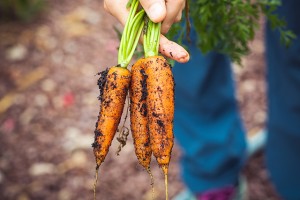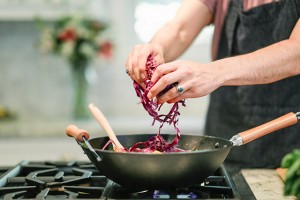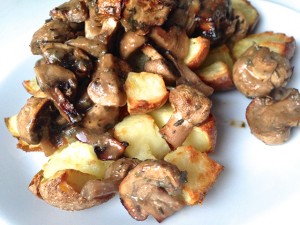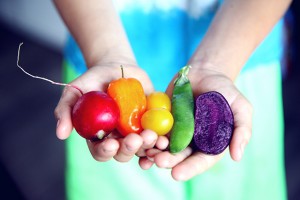I no different than most of you – I eat for pleasure and fun but I also eat for health because it makes me feel good and that’s part of the pleasure. I know, I know, health means different things to different people. For example, I know many who think that losing weight will make them healthy. But here’s the thing, weight loss does not always equate to good health, although a healthy weight is a part of being healthy.
Oh, I hate obsessing about nutrition or diets, at the expense of good food or food porn but it is important to know why certain foods are good for your body. I just want everyone to find delicious dishes that are good for you like my favourite cold-weather sipper, my mushroom cappuccino with ginger cream. It’s thick, rich, and full of silky, savoury deep, warm flavours that fill my palate, satisfy my stomach, and excite my psyche – and yes, it’s really good for you too.
Remember when we had no diet culture? When butter was good for you? When we just ate? We ate without fear, shame, expectations, rules, body betrayal and we ate vegetables without thinking it was a deprivation diet. And not surprisingly, we were healthier – and slimmer.
I teach a 5-week course on weight loss through eating healthy but I don’t believe in deprivation diets or the latest dietary advice. I simply believe in eating – the lost art of eating.
 The art of slow-roasting a Porchetta for 8 to 10 hours in a low oven while you’re busy doing something else – the art of letting the food cook itself. Don’t know what a Porchetta is? It’s an herb stuffed pork roast wrapped in pigskin and slowly roasted. The fat from the skin marinates the meat while the herbs flavour it. It’s succulent, delicious, and gelatin-rich too. I first had it in Florence, Italy. I was there for Christmas and there was a Christmas market in Piazza Navona. I bought a Porchetta sandwich from the vendor and fell in love with another seductive Italian dish.
The art of slow-roasting a Porchetta for 8 to 10 hours in a low oven while you’re busy doing something else – the art of letting the food cook itself. Don’t know what a Porchetta is? It’s an herb stuffed pork roast wrapped in pigskin and slowly roasted. The fat from the skin marinates the meat while the herbs flavour it. It’s succulent, delicious, and gelatin-rich too. I first had it in Florence, Italy. I was there for Christmas and there was a Christmas market in Piazza Navona. I bought a Porchetta sandwich from the vendor and fell in love with another seductive Italian dish.
I also teach the lost art of enjoying vegetables. Why vegetables you ask? It’s because most people can roast a chicken but when it comes to vegetables – most people are at a loss and they turn up their nose because – you don’t know what you don’t know. My theory about vegetables is this. If you hate them, then you most likely never had them prepared properly. But what’s more important is when you don’t know how to cook a vegetable, how can you feed yourself or your family?
I remember being on a book tour and a very large lady asked me to sign her book. I asked her what recipe she would be making first. She said, “oh, I don’t cook”. So I thought to myself, well then, how do you feed yourself? If you don’t cook, how do you take care of yourself?
If you know how to cook vegetables, even your kids would like asparagus, onions, and red kidney beans sautéed until the asparagus is glistening in garlic-scented extra virgin olive oil. Or how about fennel laced cabbage roasted with delicious fennel sausage. It’s amazing how the combination of fennel and cabbage together makes the cabbage taste so sweet. Just make sure your sausage is coarsely ground with no fillers – just pure, delicious spiced ground pork. I take it out of the casings and cook it up like ground meat in the skillet with garlic and onions before adding the cabbage. Wow, it’s so elegantly sweet and savoury. Yea, good stuff.
 Wendell Berry says, “Eating is an agricultural act” and what he’s really saying is we need to eat foods from the earth, unprocessed. For anyone who knows my work, you’ll know that I’ve been the champion of local food for a few decades now. Eating from farmers and farmers markets is one of the healthiest ways to eat.
Wendell Berry says, “Eating is an agricultural act” and what he’s really saying is we need to eat foods from the earth, unprocessed. For anyone who knows my work, you’ll know that I’ve been the champion of local food for a few decades now. Eating from farmers and farmers markets is one of the healthiest ways to eat.
So I say yes, vegetables are good for us and I teach people how to cook and love them. They’re rich in enzymes, antioxidants, phytonutrients and what science is now calling phytphotons – the life in a plant. And what has life in plants will find new life in our body.
But enough about nutrition, I really eat for pleasure and without rules – and I want everyone to eat without rules as well. I believe we have to cook our way out of bad eating habits. The decline of everyday home cooking doesn’t only affect the health of our bodies, but our families, communities and a sense of how eating connects us to the world around us.
So every Saturday morning on Food Therapy (CKTB 610 Talk Radio) I’ll talk about cooking and eating well – the lost art. The art of melting a pad of sweet butter in a warm skillet with chopped up garlic. When the aromas hit your olfactory senses, I lay a few scallops in the sizzling garlic butter and watch as the colour of the scallop turn from opaque to creamy white to let you know it’s ready to be devoured. Now put that over top of a bed of warm, sweet cauliflower rice. The whole dish is ready in 15 minutes, it’s perfect for an after-work meal and the pleasure your smelling, seeing and tasting is sensual, relaxing – it naturally makes you happy – without any chemical stimulants mucking up your hormones.
Eating well is a philosophy – a way of eating that feels good, is delicious, is sustainable and supports optimal health. It’s  a philosophy that uses your body signals, your emotions, and rational thought; body signals such as hunger, satiety, bloating, or acid reflux; emotions such as what do I feel like, am I tired, sad, what foods do I love and who am I cooking for; and rational thought such as what do I have on hand, how much money do I have to spend, how long do I want to be full for, how long before I can eat again, and how do I use up this vegetable in the refrigerator because if I don’t, it’s going to go bad. See how it all works together.
a philosophy that uses your body signals, your emotions, and rational thought; body signals such as hunger, satiety, bloating, or acid reflux; emotions such as what do I feel like, am I tired, sad, what foods do I love and who am I cooking for; and rational thought such as what do I have on hand, how much money do I have to spend, how long do I want to be full for, how long before I can eat again, and how do I use up this vegetable in the refrigerator because if I don’t, it’s going to go bad. See how it all works together.
That’s right, an eating philosophy is about having food on hand at all times no matter what life throws your way, you’ll always be able to prepare a nutritious and delicious meal. It’s about having the right ingredients in your pantry, cupboards and freezer. I call it having a “sense” of the kitchen, others call it a culinary sense, I call it our 7th sense and we need it for basic self-care. Yes, eating well is about self-care and self-love.
But we don’t grow our own food, we get it from a grocery store and the average grocery store has over 2000 choices for you on any day of the week and it’s interesting how we make our food choices. Sometimes we chose our food based on cravings or urges, other times it’s based on time or lack of it, some of us are particular about how our food tastes, others are lured by package colour and messaging but how many times have we picked our food based on what our body wants or needs? Not what we feel like, but what our body needs, what our body is telling us – and there lies the difference. It’s called intention. Do we eat with intention or are we easily lured into foods that are not good for us? Are you in control of your food choices or is your food in control of you?
But I don’t want anyone to feel bad because you’re not eating as well as you maybe could be. In fact, a few small changes will often make a great impact on your well-being. I want to teach you to eat broccoli without feeling that you’re automatically engaging in diet culture. I want your attitude around food to be free of any association of morality – morality around broccoli or doughnuts. I care less about what you’re eating than what you believe about what you’re eating. Does that make sense?
 And I can teach you a way of cooking that is quick, easy and inexpensive. Like making a delicious weekend soup that cleans the fridge of your soft and older vegetables so you’re not throwing them out. But eating well requires change and change is always challenging. Hopefully, over the weeks that we spend together, I can offer quick, easy solutions so the journey is a little less of a struggle and more of a pleasurable discovery.
And I can teach you a way of cooking that is quick, easy and inexpensive. Like making a delicious weekend soup that cleans the fridge of your soft and older vegetables so you’re not throwing them out. But eating well requires change and change is always challenging. Hopefully, over the weeks that we spend together, I can offer quick, easy solutions so the journey is a little less of a struggle and more of a pleasurable discovery.
But first I want to talk about the most incredible machine in the world – our body. We are gifted with the most sophisticated and dynamic machine in the world and it has one job and only one job to do and that is – to keep you alive. Alive, in my opinion, because eating brings me so much pleasure, it brings my family and friends around the table and good food allows me to express how much I care and love those around me.
That’s right, our body beats its heart all on its own, the lungs breath, it makes its own energy from the fuel we put into it, it has its own army that fights invisible invaders and it responds automatically to what’s going on around us and our internal thoughts – even though we can’t control it directly. But wouldn’t that be great if we could? We could just will off those extra pounds and think our way out of chronic disease. But we know that’s not possible.
So what is our mind good for? I’m not really sure what its purpose is other than to be spontaneous, irrational, unpredictable and to undermine the efficient working of our body. Right? What we put into our body matters and some of us don’t give that a thought or even think it’s a thing. But the truth is, that both our body and mind can work synergistically to give us a beautiful life – right to the end. As long as we believe that what we eat, matters.
So what I put into my body matters because I want to live longer, feel great and avoid disease and I don’t want to eat anything that will threaten that goal. You probably want that too so in episodes to come we’ll talk about a savoury vegetable terrine, layers of seasoned and grilled eggplant, zucchini, peppers and tomatoes laced with earthy, gutsy Emmenthal cheese melted and mingled with the essence of rosemary and savoury herbs. Warm from the oven, it  glistens on the plate and luxuriates across the palate. But if the lusciousness of a vegetable terrine doesn’t do it for you, how about something simpler, like a roasted heirloom potato oozing with earthy gut satisfying softness, cut open, drizzled with sweet, grass-fed butter, seasoned with salt and pepper, broiled until the tips turn brown, caramelized and crunchy and topped with sautéed, meaty mushrooms laced with the yummy flavour of thyme in extra virgin olive oil. It’s a meal in itself.
glistens on the plate and luxuriates across the palate. But if the lusciousness of a vegetable terrine doesn’t do it for you, how about something simpler, like a roasted heirloom potato oozing with earthy gut satisfying softness, cut open, drizzled with sweet, grass-fed butter, seasoned with salt and pepper, broiled until the tips turn brown, caramelized and crunchy and topped with sautéed, meaty mushrooms laced with the yummy flavour of thyme in extra virgin olive oil. It’s a meal in itself.
So here’s the thing with the baked potato dish. Baking it in its jacket is once, baked. Slicing it open, buttering it and broiling it is twice baked. Now the starches in the potato gravitate to the surface and become the sweetness that caramelizes along with the sweet butter and the salt emphasizes and magnifies the sweet flavour and you have one creamy, sweet baked potato.
Ok, but is this buttery baked potato ok for everyone to eat? Again, the devil is in the details. For anyone watching their weight or blood glucose levels, they may not want to eat this carbohydrate-rich potato, if you’re healing from any condition, you may not want to raise your blood sugar because it causes metabolic stress and robs your body from its healing abilities, but if you’re a healthy person with no carbohydrate intolerance issues then – yes! Go crazy with these potatoes every once in a while because they make a full meal that is giddy delicious.
Now that I’m a nutritionist, I have different conversations with people than as a food writer and what I’ve noticed is that people eat what they believe to be healthy foods and they’re frustrated that their body is not what they want it to be. They could be overweight, tired, have inflammation that expresses itself as sore, stiff joints, or a low immune system that makes it difficult to fight seasonal colds and the flu – but we all believe we’re eating well. Of course, we believe it, we wouldn’t intentionally make ourselves sick – would we? But here’s a concept for you – have you ever thought that food can heal you?
So if we’re doing what we believe is right and it’s not working for us, then perhaps it’s time to revisit what we believe. So here’s the thing. Never in the history of man have we ever eaten so many man-made foods and never in the history of man have we ever been sicker. So what does that tell you? – it tells me that what you put in your body matters.
So like I said earlier, I’m not going to lose sight of delicious eating by obsessing over nutrition. We’re simply going to have some delicious fun and create a community of eaters who believe as I do – that what you put in your body matters.

